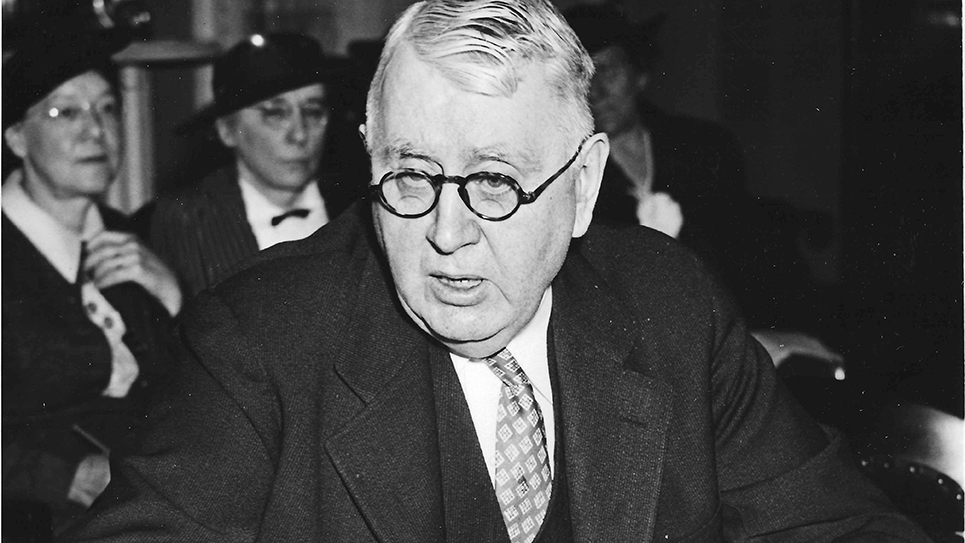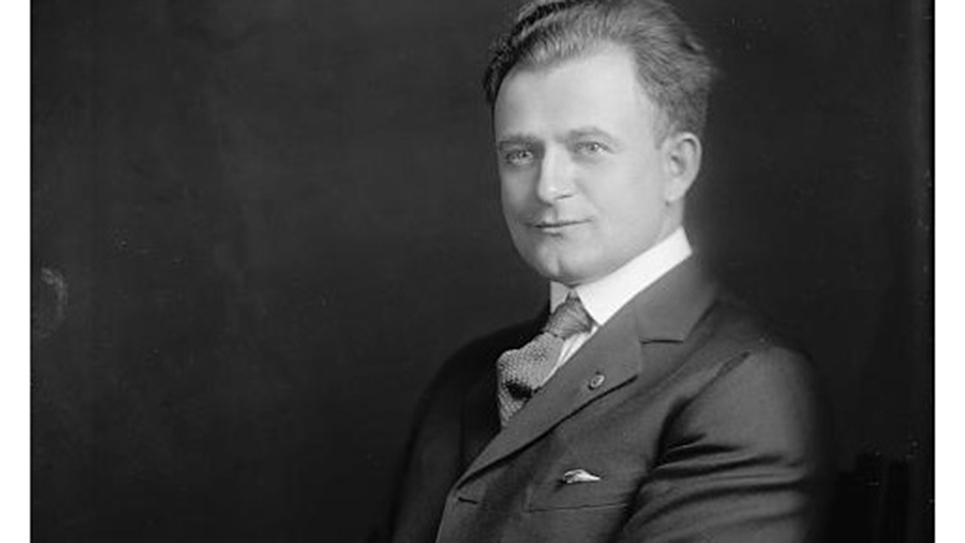The War Referendum: Congressman Louis Ludlow of Indiana
By Ray Hill
Louis Ludlow is largely forgotten today, but during his heyday in the 1930s, he was one of the most well-known members of Congress. A newspaperman by trade, Ludlow became famous for proposing legislation that would require Americans to vote in a referendum before a declaration of war could be made. Congressman Ludlow’s bill would have changed the Constitution to require the referendum without exception save in the case the country was actually invaded. To give modern readers an idea of how popular the Ludlow Bill was with the public, it took President Franklin D. Roosevelt and his administration to use every means at their collective disposal to beat back Ludlow and his legislation and they won by only 21 votes in the House of Representatives.
Tall, gray-haired and bespectacled, Louis Ludlow was not an especially impressive-looking tribune of the people. The congressman looked like exactly what he was: a former newspaperman from the Hoosier State. During his service in Congress, Ludlow always considered himself to be a typical Indianan.
As might be expected, the Ludlow Bill became highly controversial with opponents pointing out its imperfections and failings while proponents hailed the idea of war being the result of a collective decision, taken out of the hands of professional politicians. The issue of isolationism versus internationalism isn’t as clear-cut as many revisionist historians like to think. During the 1930s, the great majority of Americans remembered the sacrifice of blood and treasure paid by the United States during the First World War. That same majority was highly averse to the idea of engaging in foreign wars yet again. It would be foolish to surmise the elected representatives of the people, congressmen and U.S. senators, simply flouted the will of their constituents by insisting America remain an island amongst the nations of the world. Those same congressmen and senators were in office because, by and large, they reflected the opinions of those who sent them to Washington, D.C.
With some notable exceptions, the national news media of the day was more internationalist than what they termed as “isolationist,” especially the publications of Henry Luce. Husband of glamorous playwright and sometime Congresswoman Clare Booth Luce, Henry Luce was one of the most powerful publishing magnates in the country. He was the owner and publisher of two of the most widely read publications in the country, TIME and LIFE magazines, which were read by millions weekly. TIME magazine’s first issue was released on March 3, 1923. It was the first national news magazine to be printed in New York City. Henry Luce and his co-founder, Briton Hadden, had in mind that the magazine could supply its readers concisely all the important news of the week in a more efficient and to-the-point fashion. Hadden insisted the news magazine be fun as well, which caused TIME to publish articles on popular culture featuring not only politicians, but also celebrities, movies, and other entertainment. Hadden died in 1929, leaving Luce to rule over his burgeoning media empire. Henry Luce became one of the important figures in the history of 20th-century media in the United States.
Luce’s fingerprint was well stamped upon his publication and those who preferred America tend to its own business were almost never given good publicity inside the pages of TIME magazine. Quite to the contrary, TIME writers were highly skilled in writing to-the-point scathing personal descriptions of their quarry. Although Henry Luce was personally a Republican, he played no favorites, happy to skewer both Republicans and Democrats who were against an international role for America. Congressman Louis Ludlow was dismissed as “a rabid isolationist.”
At the time and since, much of the news media portrayed the viewpoint of those in Congress against a greater international role for America as the result of “xenophobia, racism and nativism. . .” For most of the congressional isolationists, it was less isolationism than it was putting America before any other country and most of those representatives and senators charged with isolationism by an unfriendly new media insisted not only were they representing the people that had elected them, but also putting the interests of the United States first. Personally, Congressman Louis Ludlow was strongly in favor of equal rights for women, as well as Blacks throughout his political career. Like many of his colleagues, Ludlow had been deeply affected by the results of an investigation made of the banking and munitions industries, which had reaped handsome profits from the First World War. Many progressives – – – and the bulk of congressional isolationists were considered to be progressives at the time, both Republicans and Democrats – – – were profoundly influenced by that same investigation. Congressman Ludlow worried a declaration of war by the United States was unduly influenced by both propaganda from the media and influence from corporations. “I am willing to die for my beloved country but I am not willing to die for greedy selfish interests that want to use me as their pawn,” Ludlow insisted.
TIME also referred to the “hulking ex-newshawk” who had come to the House of Representatives after a career as a reporter and journalist. Ludlow first came to Congress in 1928 when he defeated incumbent Ralph E. Updike, who had been elected when only 30 years old. Ludlow nudged Updike out of office by just over 6,000 votes to represent the City of Indianapolis in the House of Representatives. Louis Ludlow remained personally popular inside his district and remained in Congress until his voluntary retirement in 1948. Throughout his political career, Ludlow staved off quality GOP candidates due to his diligence in representing the people of his district, as well as reflecting their opinions in the House of Representatives.
Ludlow’s thinking had been molded from his time covering Congress for a local Indiana newspaper. Unlike most newly elected congressmen, Ludlow understood Washington better than most. Louis Ludlow also covered the frequently heated debates held in the House of Representatives and the U.S. Senate over American entry into the First World War. Following the war, Ludlow worried American participation in the League of Nations would increase the risk of the United States becoming involved in more global conflicts and wars. In 1927, Louis Ludlow reached the apex of his career as a newspaperman and journalist, having been elected president of the National Press Club. By the end of that same year, Ludlow had the full backing of Indiana’s Democratic Party organization to challenge Congressman Ralph Updike in the 1928 election.
At one time, the Ku Klux Klan enjoyed considerable political power in Indiana’s politics. Ralph Updike had not only been a member of the KKK but also an officer in the organization. As the political power of the Klan began to ebb in Indiana, Louis Ludlow campaigned saying his candidacy offered voters “redemption” from the KKK. The argument was persuasive, as Ludlow beat Updike decisively, the only Democrat to win in Marion County.
The Indianapolis Star acknowledged Ludlow’s familiarity with Washington, D. C. and the Congress, writing, “Perhaps no man ever entering Congress has had the goodwill of so many members on both sides of the aisle.” Even prominent and partisan Republican Senator James E. Watson said, “Everybody has a fondness for Louis Ludlow, and as a congressional colleague, he shall have the cooperation of my office in the advancement of whatever he considers in the interest of his constituency.”
During his first few years in Congress, Louis Ludlow concentrated upon those parochial matters that keep congressmen in office. Ludlow helped to locate a hospital for veterans in Indianapolis, as well as convincing Postmaster General James A. Farley to add the city to the Post Office Department’s air mail route. Congressman Ludlow is best remembered today for his proposed war referendum amendment to the Constitution, but he introduced a similar amendment to provide equal rights to women five times in the House of Representatives. The Indiana congressman was never daunted by the failure of his colleagues to pass his proposals; he simply renewed his efforts over and over again.
Congressman Ludlow followed the proceedings of the special committee formed by the United States Senate to probe the influence of the munitions interests in the country and how that supposed influence affected the United States in entering the First World War. Louis Ludlow was distressed about the Nye Committee’s findings (named for North Dakota Senator Gerald P. Nye, the chairman of the committee). Ludlow stated his belief America had gone to war on the side of the Allies in World War I due to “a mere dozen – half a dozen international financiers and half a dozen munitions kings, with a complaisant President in the White House at Washington – – – could maneuver this country into war at any time, so great are their resources and so far reaching is their power. . .” It was a stunning indictment, especially for a Democrat in Congress to refer to Woodrow Wilson as a “complaisant President.” Ludlow continued, saying, “I pray to God we may never have a President who will lend himself to such activities, but, after all, Presidents are human and many Presidents have been devoted to the material aggrandizement of our country to the exclusion of spiritual values. . .”
Although largely a supporter of President Franklin Roosevelt, Congressman Louis Ludlow considered powers extended to FDR in the hands of other men. Ludlow’s proposed amendment to the Constitution was designed to forestall the possibility the legislative and executive branches of the American government might be lured into war because of financial pressures. Ludlow phrased his legislation plainly and simply. The Indiana congressman said, “First. To give the people who have to pay the awful costs of war the right to decide whether there shall be war. Second. To remove the profit incentive to war.” The voice of a nation, Ludlow believed, would protect the flower of young manhood of the United States from being used as cannon fodder by the “selfish interests.”
Like many tens of thousands of Americans during the 1930s, Congressman Ludlow grew increasingly uneasy as Adolf Hitler began his climb to power and began rearming Germany. Equally upsetting was the aggressiveness of the Japanese Empire in the East. Few members of Congress were under the delusion that war clouds were gathering over Asia and Europe. The conquest of Ethiopia by Italian dictator Benito Mussolini and the invasion of China by Japan helped reinforce the determination of many congressmen and senators to distance American foreign policy from potential conflict and wars.
For the most part, the congressional leaders, at the behest of the Roosevelt administration, kept Ludlow’s bill locked away in committee without bringing it to a vote. As Roosevelt sought to pack the U.S. Supreme Court, the persistent Hoosier managed to obtain the necessary number of signatures from his colleagues, which allowed Ludlow to discharge the bill from committee where it was held hostage. The Roosevelt administration was not alone in opposing Ludlow’s proposed amendment to the Constitution; so, too, did the American Legion and other veterans’ organizations. Critics of the bill argued it would seriously diminish the president’s authority as Commander-in-Chief, as well as diminish the presidency in the eyes of foreign powers. Others complained it would impede the State Department’s functions. Some argued it would be perceived as an act of weakness by those countries who were not friendly to the United States. Ludlow had his own supporters, including no less than 1,000 nationally known Americans who fervently backed his proposal. The final vote in the House of Representatives on the Ludlow amendment was 209 against 188 in favor.
Following the attack by the Japanese Empire on Pearl Harbor, Congressman Louis Ludlow voted to declare war on the Axis powers. Ludlow voluntarily retired from the House when he chose not to seek reelection in 1948. The following year, he returned to a seat in the Press Gallery of the House Chamber. Ludlow was seriously ailing. The former congressman died November 28, 1950, at age 77. © 2024 Ray Hill







